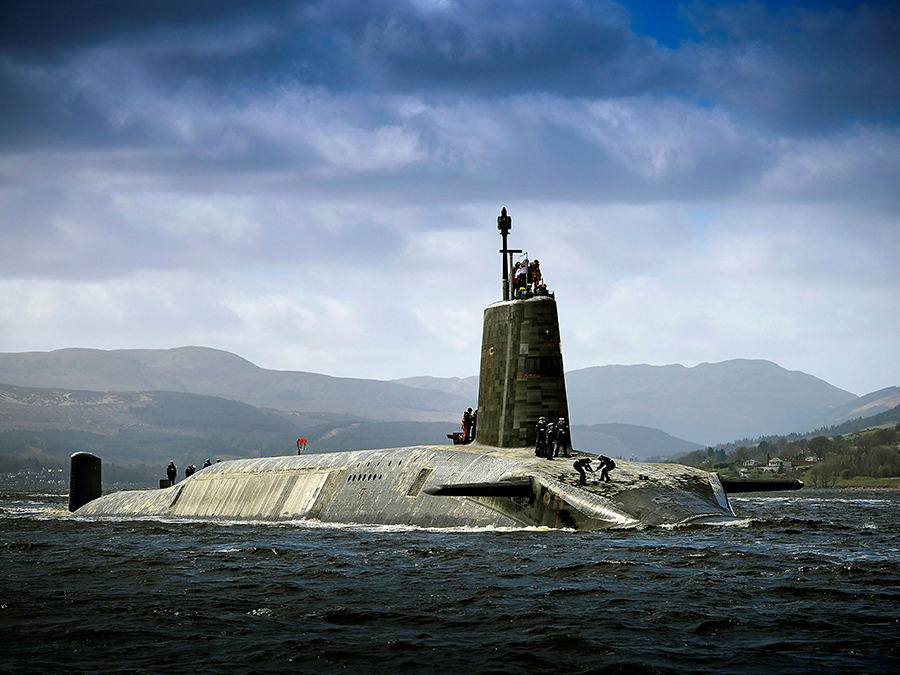"Though we have achieved progress, our work is not over. That is why I support the mission of the Arms Control Association. It is, quite simply, the most effective and important organization working in the field today."
UK May Host U.S. Nuclear Weapons Again
October 2023
By Shannon Bugos
The United Kingdom may host U.S. nuclear weapons on its territory for the first time since their complete withdrawal 15 years ago, a move that Russia stated would escalate already high nuclear tensions in Europe.
 U.S. Air Force budget documents for fiscal year 2024 revealed plans for the construction of a dormitory at Royal Air Force Lakenheath that will be needed to handle “the influx of airmen due to the arrival of the potential Surety mission,” according to an analysis by Hans Kristensen and Matt Korda of the Federation of American Scientists on Aug. 28. The United States often employs the term “surety” when referring to the safety and security of U.S. nuclear weapons.
U.S. Air Force budget documents for fiscal year 2024 revealed plans for the construction of a dormitory at Royal Air Force Lakenheath that will be needed to handle “the influx of airmen due to the arrival of the potential Surety mission,” according to an analysis by Hans Kristensen and Matt Korda of the Federation of American Scientists on Aug. 28. The United States often employs the term “surety” when referring to the safety and security of U.S. nuclear weapons.
Russian Foreign Ministry spokesperson Maria Zakharova denounced the potential move on Sept. 5, saying that “[i]f this step is ever taken, we will view it as escalation, as a step that would take things in a direction that is quite opposite to addressing the pressing issue of pulling all nuclear weapons out of European countries.” Meanwhile, Russia purportedly has been transferring tactical nuclear weapons to Belarus.
The UK nuclear arsenal consists of an estimated 225 nuclear warheads for submarine-launched ballistic missiles. The U.S. nuclear weapons that potentially are headed for the UK most likely would be B61-12 gravity bombs.
Currently, the United States is believed to deploy an estimated 100 B61gravity bombs across five other European countries—Belgium, Germany, Italy, the Netherlands, and Turkey—under the NATO nuclear sharing mission. Washington withdrew an estimated 110 B61 bombs from Lakenheath in 2008.
A spokesperson for the UK Defense Ministry told The Guardian on Aug. 29 that “it remains a long-standing UK and NATO policy to neither confirm nor deny the presence of nuclear weapons at a given location.”
Kristensen and Korda offered a possible explanation for what looks like the return of U.S. nuclear weapons to the UK, suggesting that perhaps “the United States is currently preparing the infrastructure at RAF Lakenheath to allow the base to potentially receive nuclear weapons in the future or in the midst of a crisis, without necessarily having already decided to permanently station them there or increase the number of weapons currently stored in Europe.”
Marion Messmer of Chatham House in the UK suggested another interpretation. “There has also been a fairly sensitive discussion since the coup attempt in Turkey in 2016, and the long-running civil war in Syria, over whether the nuclear weapons which are assumed to be stationed in Turkey are safe there,” she told Arms Control Today on Sept. 19. “So, another potential explanation for this investment in Lakenheath might be that when the nuclear weapons are next going to be serviced, they won’t be replaced in Turkey, and will instead be stationed in the UK.”
Plans call for the dormitory construction to begin in June 2024 and finish in February 2026. The 2024 budget allotted $50 million for the project. Meanwhile, NATO is overseeing infrastructure and security upgrades at nuclear weapons storage sites in Europe, including Lakenheath, according to 2023 budget documents.
The activities at Lakenheath coincide with the anticipated arrival in Europe this year of new B61-12 bombs, which are replacing the B61-3/4 bombs, and amid the phased delivery of the nuclear-capable F-35A Lightning II jets to a U.S. Air Force squadron stationed at the UK base. The first aircraft of a planned 24 arrived in December 2021.
